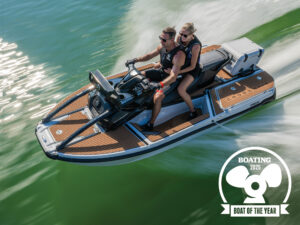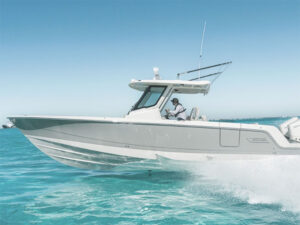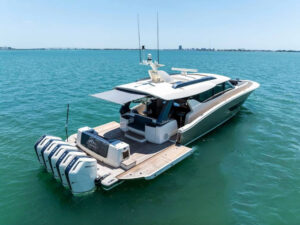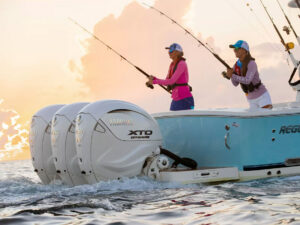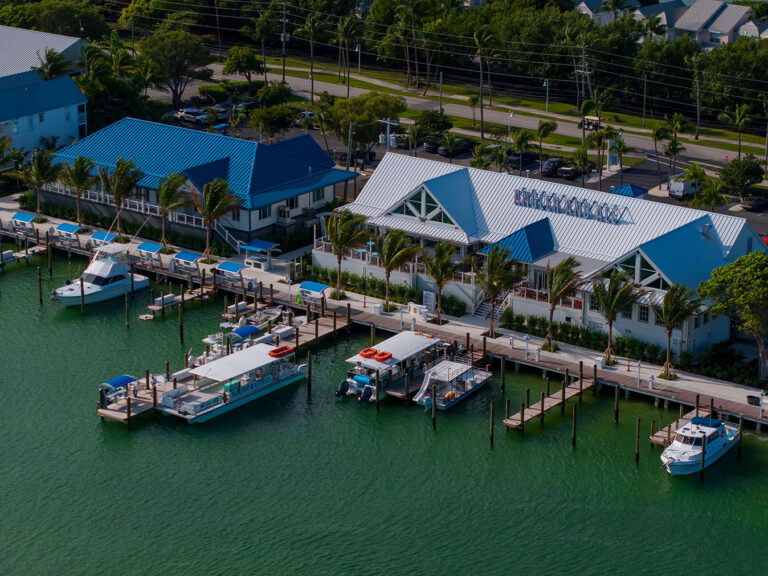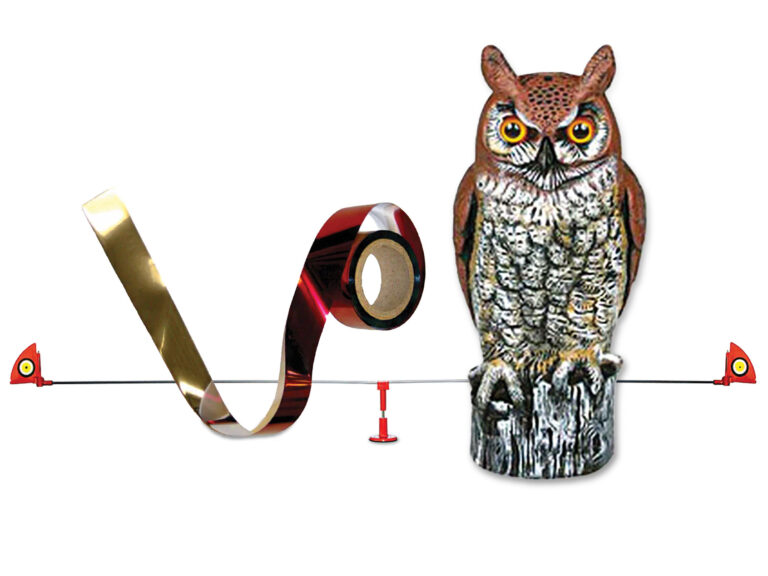
New gelcoat finishes project a radiate shine, but over years that new-boat gloss can grow dull and chalky. Polishing helps bring back the luster, and applying quality marine wax products help protect it from fading. Eventually, however, it will grow dull again, and as time marches on, it gets tougher to bring it back to like-new condition.
Such was the case with a 1970s vintage Enterprise cathedral-hull bowrider restored and repowered by Nadean Corbisier, with help from her fiancé Matt Cevallos and her dad, Dean Corbisier, a district sales manager for Suzuki Marine.
The old boat looked nice. But the avocado-green gelcoat (a popular color in the ‘70s) on the topsides needed help. Despite lots of polishing and waxing, elbow grease failed to restore the shine of its glory days. To help bring it back, Nadean decided to apply DiamondFinish Clear from KBS Coatings. This one-part clear-coat product is designed to create a glossy, super-hard and non-yellowing finish on a variety of surfaces, including metal, paint and gelcoat.
The KBS DiamondFinish Clear can be brushed, rolled or sprayed, and once completely cured, allows for wet-sanding and polishing to eliminate minor imperfections. Nadean decided to roll it on, while using a brush to cover the nooks and crannies. Here’s how to do it yourself.
Skill Level: 3 of 5
Finish Time: Approx. 3 hours, depending on surface area
Tools and Supplies
- DiamondFinish Clear ($58.95/quart, covers approx. 100 square feet; kbs-coatings.com)
- KBS #1 Thinner ($8.95/8-ounce bottle; kbs-coatings.com)
- KBS Klean ($12.95/quart, kbs-coatings.com)
- Spray bottle
- Scouring pads
- Masking tape and paper
- Foam rollers and brushes
- Metal mixing container and roller pan
- Mixing sticks
- Rubber gloves
- Eye protection
- Shop rags for clean up

As with any painting, preparation proves crucial. In this case, it’s necessary to remove contaminants such as grease, oil, grime, scum or residual wax, and lightly scuff the surface to ensure strong adhesion. Use KBS Klean, a concentrated water-based cleaning solution. Dilute with 10 parts warm water to one part of KBS Klean and use a spray bottle to liberally wet the surface. Scrub thoroughly with a scouring pad, continually to wetting the working area with diluted KBS Klean. Scour all surfaces to be clear-coated. Then rinse with fresh water and allow to dry. Afterward, the surface should take on a dull finish.

Whether rolling, brushing or spraying, it’s best to remove as many elements as feasible before getting underway with the process to prevent inadvertently getting clear coat on these items. On the interior, this includes removal of upholstered seats and panels, snap-in deck coverings, instrumentation, hand rails, teak or other wood items, and other elements. On the exterior, this includes windshields and frames, navigation lights, cleats and other hardware. To protect any adjacent surfaces that you can’t or don’t want to remove, use masking tape and masking paper to cover them up.

Do not shake the can of DiamondFinish Clear, as this can introduce air bubbles that will mar the finish. Instead, wearing protective gloves and eye wear and working in a well-ventilated area, pour a working amount into a steel or glass container. For long-term storage, put the remain product in a Mason jar. The ideal temperature for rolling on the clear coat between 60 to 82 degrees F with low humidity. Based on these conditions, thin the DiamondFinish Clear by 10 percent using KBS #1 Thinner (or Xylene). Stir thoroughly and frequently. On hot days, thin by as 30 percent ensure proper flows. Stir the container thoroughly and frequently.
Tip: When resealing a can of DiamondFinish Clear, use plastic wrap between the lid and the top of the can to stop metal to metal contact as clear coat can permanently seal the lid. Store in a cool dry place.

Apply DiamondFinish Clear using a bristle brush, foam brush or tight-knap foam roller to a test area first. Don’t use polyester knit or woven roller that might shed lint. When brushing or rolling, the self-leveling properties of DiamondFinish Clear allow the mixture to flow out evenly. Do not overwork the brush or roller, as this forces out the solvents and can cause the clear coast to cure too quickly and lose it ability to level out. Apply to an area and then move on immediately to the next. At the same time, avoid applying too heavy in one area, as this can lead to puddling, pooling and drips.
Tip: Avoid applying DiamondFinish Clear when it is breezy. Blowing dust and other minute debris can stick to the wet coating and lead to less-than-satisfactory results in the finished product. Also, avoid application in high humidity or rainy weather.

Average touch-cure time is 2 to 3 hours, depending on humidity levels. Remove any masking tape at the stage. The finish requires another 7 days for a full cure under normal conditions, and it will continue to harden over the following weeks. Keep boat covers off of the finish until it is fully cured, as the fabric can mar the finish. Once the DiamondFinish Clear is completely hardened, it can be wet-sanded with 1,000- to 1,200-grit wet-dry sandpaper to minimize any imperfections such as dimpling (aka orange peel) patterns, small drips or an errant gnat.
Read Next: Dolphinite GelMatch Gelcoat Repair Spray Test

DiamondFinish Clear can also be sprayed with siphon/pot gun (25 to 35 psi) or gravity/top container gun (35 to 45 psi). KBS recommends a 1.4 to 1.5 nozzle, thinning the mixture with one part KBS #1 Thinner (or Xylene) to 10 parts DiamondFinish. Two thin coats are recommended, with the second coat taking place 2 to 6 hours after the first. Use KBS #1 Thinner or Xylene for immediate clean up including the spray gun, as once DiamondFinish Clear cures, it cannot be removed by any solvent. To learn more, visit kbs-coatings.com

